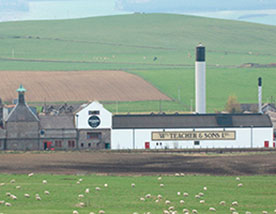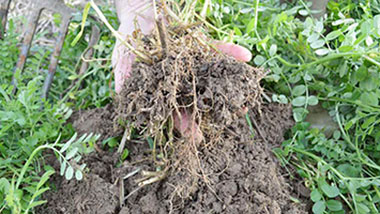Our Policy and Approach
The nature and its ecosystem - forests nurtured by water, rivers, oceans, atmosphere and living creatures - are the valuable management foundation of Suntory Group’s business. As a company whose products rely on blessings of nature, we strive to protect nature and its ecosystem at the source of our water and ingredients through water source conservation, bird conservation activities, and a shift to sustainable agricultural practices.

Disclosure Based on TNFD Recommendations
For promoting to set science-based targets for nature and activities to achieve them, Suntory Group is participating in the program run by the Science Based Targets Network (SBTN) for piloting the target validation process in accordance with the SBTN guidance released in May 2023, being the only Japanese company among the 17 piloting companies.
We have started pilot disclosure of the Taskforce on Nature-related Financial Disclosures (TNFD) based on assessments and progress made in the SBTN validation pilot.
For more information, see Disclosures Based on TNFD Recommendations
Promoting Structure
Global Sustainability Committee (GSC)
To promote sustainability management, the Global Sustainability Committee (GSC) acts as an advisory committee to the Board of Directors. The Group’s sustainability strategies and the progress on priority themes (water, climate change, containers and packaging, raw ingredients, health, human rights and enriching life) are discussed in the GSC under the lead of the Chief Sustainability Officer.
For more information on the Global Sustainability Committee, see Environmental Management.
Initiatives
Water Sustainability
Suntory Natural Water Sanctuary
To preserve the integrity and sustainability of groundwater, Suntory Group has been cultivating forests in the watersheds around our plants as sanctuaries to nurture groundwater. These forests recharge more than twice the amount of water withdrawn by our plants in Japan.
Forests that nurture pristine groundwater are also rich in biodiversity. When the forest ecosystem is restored, the flora and fauna also begin to thrive in new ways. The Suntory Natural Water Sanctuary is managed systematically through continuous monitoring of the ecosystem, which includes plants, birds, and other wildlife.
Considering how wild birds are a barometer of environmental health, we have experts conduct a wild bird survey every year to furnish a broader understanding of the changes taking place in the entire supporting ecosystem.
At Natural Water Sanctuaries in Japan, we are carrying out an Eagle and Hawk Chick-Rearing Support Project to support the nesting and breeding of birds of prey, which are at the top of the ecological pyramid. The aim is to continue maintaining forests rich in biodiversity from the perspective of protecting birds.

30by30 Alliance for Biodiversity
In April 2022, Suntory Group joined the 30by30 Alliance for Biodiversity. The alliance is formed as a voluntary coalition of local governments, companies, and NPOs to conserve or protect at least 30% of Japan’s land and sea areas by 2030 to halt loss and restore biodiversity. Its objective is to promote and to actively communicate the initiative to expand Japan's national parks and to register socio-ecological production landscapes (satochi-satoyama) and company-owned forests in the World Database as OECMs*.
Six of Suntory Group’s Natural Water Sanctuaries receives approval to be certified as OECM.
The six Suntory Natural Water Sanctuary sites certified as OECM are:
1. Hyogo Nishiwaki-Monryusan (Nishiwaki City, Hyogo)
2. Tokyo Akigawa (Akiruno City, Tokyo)
3. Shizuoka Oyama (Oyama Town, Shizuoka)
4. Nikko Kirifuri (Nikko City, Tochigi)
5. Ohmi (Hino Town, Shiga)
6. Akagi (Shibukawa city, Maebashi city, Gunma)
-
*OECM stands for “Other Effective area-based Conservation Measures.” OECMs are areas conserved at the initiative of private organizations or areas where the conservation of nature is achieved mainly as a by-product of other management.

Publication of a biodiversity report
The “Suntory Natural Water Sanctuary Biodiversity Restoration Report” was issued in September 2022. The report is structured into two parts— a "Facts & Data" section that summarizes various issues facing Japanese forests and an “Actions” section which provides simple explanations and examples of activities taken to address these issues in the Suntory Natural Water Sanctuary.
Download the Suntory Natural Water Sanctuary Biodiversity Restoration Report
For more information on the Suntory Natural Water Sanctuary, see Natural Water Sanctuary.

Suntory’s Peatland Water Sanctuary Initiative in Scotland
Suntory Group acknowledges the immeasurable amount of learning it has received from Scotland and scotch whisky, which has been utilized in the production of whisky in Japan. Today, Suntory owns several distilleries in Scotland, including the Bowmore and Laphroaig distilleries. In Scotland, whisky is often made with water that flows through moorlands, and the peat accumulated on the moorlands plays an important role in flavoring the malt, the raw material for whisky. Suntory’s Peatland Water Sanctuary initiative started in November 2022 to protect these peatlands and conserve watersheds at various locations in Scotland. The initial peatland restoration project was begun on nearly 15ha near the Ardmore distillery in partnership with Forestry and Land Scotland, which owns the land, and the James Hutton Institute, which is assisting with the research, planning, and execution of the restoration. Restoration activities subsequently began on Islay and in northern Scotland, where peat was mined for scotch in the past, and in nature reserves in Airds Moss and the Oa, activities were launched in collaboration with the Royal Society for the Protection of Birds of Scotland. Additional activities are expected to launch, and Suntory Group aims to have restored sufficient peatlands by 2040 to equate to twice the volume of peat that Suntory Group harvests to make its scotch whiskies. The work will have a long-term positive impact on water retention and quality, and will also support carbon sequestration and biodiversity in Scotland’s natural environment.
-
Recovery work has raised the water table of
this peatland, and restoration of marshland
vegetation is progressing -

Ardmore Distillery
Raw Ingredients
As a beneficiary of nature’s bounty, Suntory Group is committed to preserving biodiversity in the raw ingredient crops it uses for raw ingredients. Suntory Beverage & Food Great Britain and Ireland has been providing blackcurrant farmers with sustainable farming support since 2004. The company has established a biodiversity roadmap tailored to each farm and its surrounding habitat and is promoting ecosystem conservation for rivers and wetlands. In 2022, the company has shared the results from its Farm Stewardship Programe which aims to boost biodiversity on blackcurrant farms across the UK. Other efforts within the Group include adopting regenerative agriculture methods that help improve soil organism diversity such as the use of mulching at vineyards and start of pilot program for sourcing barley produced using regenerative agriculture practices.
Download the Farm Stewardship Programe Report
For more information, see Sustainable Procurement .
-

Cover crops
-

Vineyard with grass mulch at
Suntory Tominooka Winery -

Farm Stewardship
Programe Report
Containers and Packaging
In addition to ecological efforts in water and crops, Suntory Group aims to make effective use of limited natural resources by promoting the 3Rs (reduce, reuse, recycle), employing renewable resources, collaborating with diverse stakeholders to build efficient recycling systems, and working to reduce the environmental impact of our products throughout their lifecycles.
In regard to PET bottles specifically, Suntory Group has a unique 2R+B (Reduce/Recycle + Bio) strategy. We are pursuing the efficient use of resources by developing bottles with reduced resin content and enhanced use of bio-based materials and thereby replacing petroleum-derived materials with renewable materials as far as possible.

Concept of 3Rs in Containers and Packaging

2R+B Strategy
Bird Conservation
Recognizing that wild birds are barometers of the environment, Suntory has advocated that protecting birds leads to protecting human beings and the natural environment and started its bird conservation activities in 1973. The company established the Suntory Fund for Bird Conservation in 1989 to promote environmental conservation by providing grants to various bird conservation activities. The Fund has granted a total of approximately 700 million Japanese yen to a total of 517 organizations as of 2024.
-

First Save the Birds!
Campaign newspaper ad -
